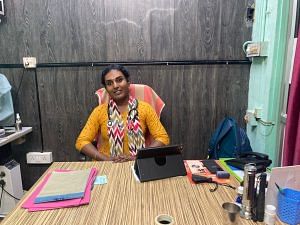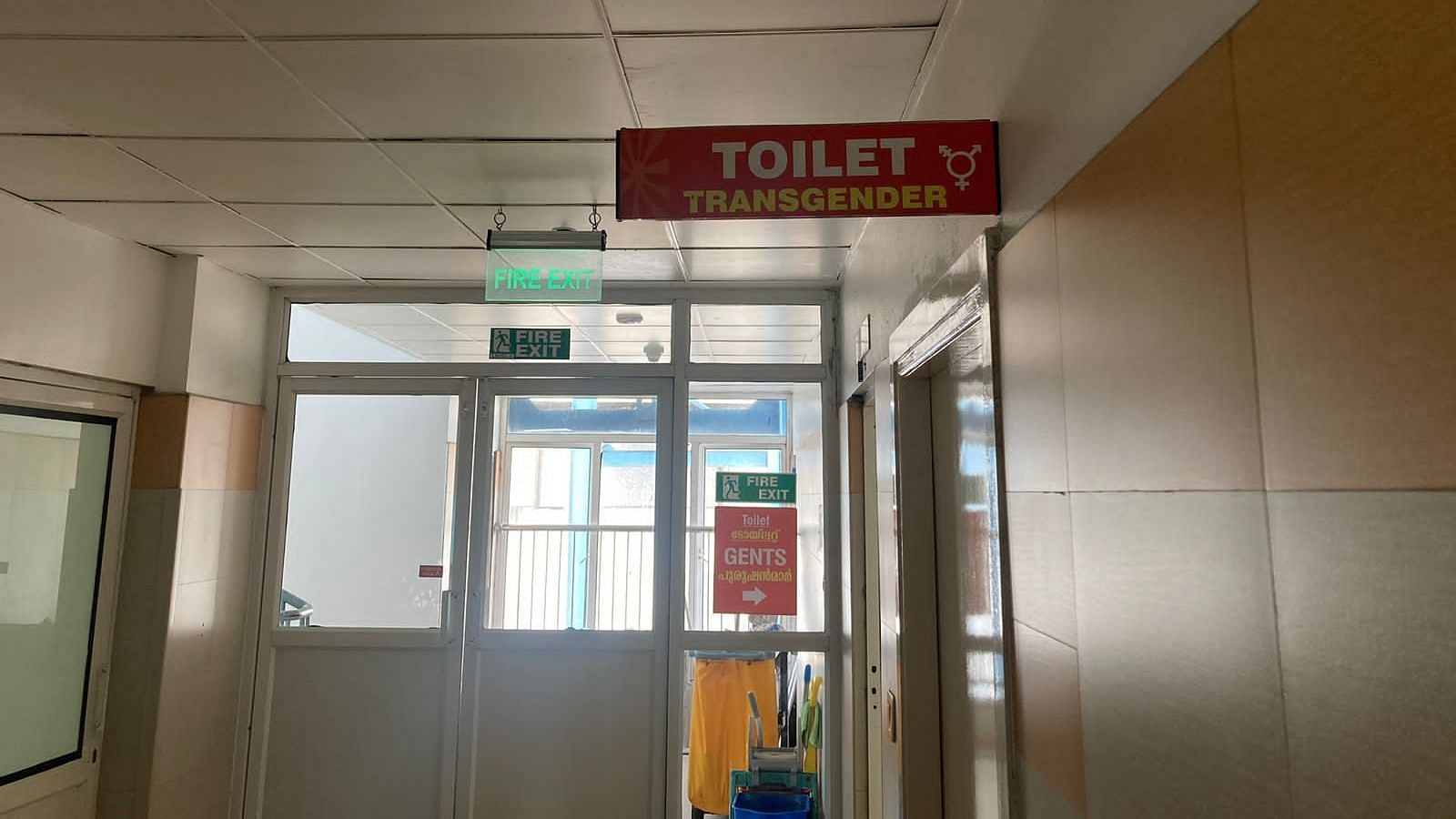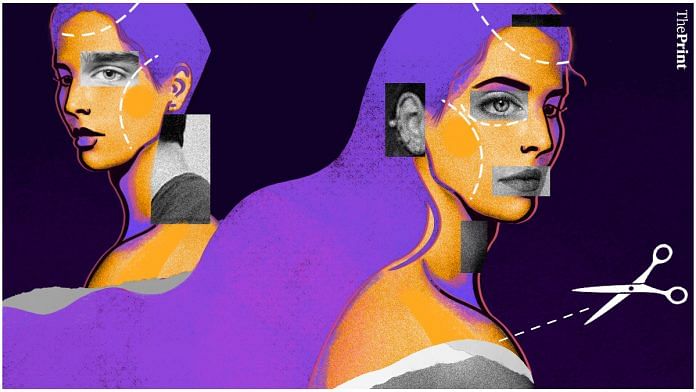Sera Franco woke up on 11 September 2021 and knew her life was about to change. She was finally going to get rid of the social stigma and self-doubt around her gender identity. The surgery was going to help her become her real self.
Instead, she woke up to pain, infections, and even worse—depression. Now, exactly one year after her gender affirmation surgery, Sera Franco has a word of advice: Therapy.
“Should I have done it? I can’t say that I regret it,” says Sera. “But to those who want to do it: You should know that there’s a lot that you can’t control. Do it only after you get proper counselling and take care of your mental health. And there’s absolutely no way you can do it alone.”
Sera is one of several Malayali transgender persons who have experienced a host of complications after their Sex Reassignment Surgery (SRS). If she could do things differently after her vaginoplasty last year, she would have taken more time to understand the surgery and side effects of transitioning.
A gruelling journey
Surgery is an important and liberating option for members of the Malayali trans community, but a few bad surgeries are making many anxious, compounding feelings of loneliness, rejection, and body dysmorphia.
In Kerala, there is both money and the willingness to conduct surgeries. But what it lacks is counselling and hand-holding before and after. Kerala was the first state to offer financial aid for gender affirmation surgeries in India, followed by Tamil Nadu, Rajasthan and Maharashtra. Although there are doctors — from urologists and plastic surgeons to gynaecologists — who are available to perform surgery in private hospitals, there is very little training on how to provide wall-to-wall service for patients. And there is no insurance either.
Just a few months before Sera’s surgery, in July 2021, the community was rocked by a suicide. Anannyah, Kerala’s first transgender radio jockey—and the first transperson to file nomination papers to contest in the state’s assembly elections—took her life a few days after alleging medical negligence during her surgery. She described her genitals as looking like they had been “cut ruthlessly with a knife.”
She was on radio because she wanted to be “a voice of the community,” and was heard nationwide. Headlines proclaimed she “alleged botched surgery,” sparking widespread protests. Media coverage and the community’s grief over her loss linked her death to unhappiness over her surgery. Calling her a ‘role model’ and a ‘warrior’, messages of support poured in from her friends and members of the queer community. Days after her death, her partner was also found hanging.
“‘My body, my rights, always,” says Surya, a trans activist who was close to Anannyah. “But if you’re thinking about surgery — or performing surgeries — learn about it first.”
Surya knows of at least 10 people in the last year who have died by suicide after gender affirmation surgery. An independent fact-finding report on Anannyah’s death says 13 queer people have taken their life in the last four years.
The community is ready to transition but not everyone is aware of what goes into the process. And business is booming from the state-offered financial aid. “Our bodies are treated like dummies for experiments. And if the experiment fails, we don’t get the freedom to feel relief in our true selves,” says Surya.
Also read: Chennai transgender groups are living their Bharatnatyam dream—for respect, dignity, livelihood
No option but faith
Despite the issues, members of the community still have faith in Kerala’s medical system. Mostly because they have no other choice, says award-winning bodybuilder and trans man Praveen Nath. He has had three gender affirmation surgeries so far — each excruciatingly painful and each falling short of its desired effect.

Dressed in a white t-shirt and boxers, Praveen has just showered after his morning training session. He’s preparing for a bodybuilding competition in October. The way his body looks and feels is not only important to his gender identity but is also what he depends on for money.
That’s why he decided to wait out his surgical transitions. The first procedure — as earlier reported by The Morning Context — he had was top surgery in 2019. In January 2022, his metoidioplasty, or lower-body surgery, didn’t go well. It resulted in severe urine leakage, and he had to rely on catheters and urine bags for a while. Finally, a third corrective surgery reversed the side effects of the second, and his urethra reopened. Each medical check-up involved a painful three-hour drive from his home in Thrissur to the hospital in Kochi. He can count every speed bump on the way now.
“I’m not angry. But I don’t think I’ve fully processed what I’ve been through,” he says.
He pauses to answer a call on his phone, encased in a rainbow flag cover. It’s a trans woman asking for help to apply for a transgender identity card with her new name. Praveen patiently explains what she needs to do, and passes on the number of a trans-friendly lawyer who can help her notarise an affidavit.
“We can’t always be fighting against the state and the law, it’s exhausting,” he says. Even being called by the right pronouns and name has been an uphill battle.
“What hurt is that the doctors made me feel like it was my fault my skin wasn’t healing.”
Also read: Biggest battle Indian transgender people are waging is against the humble school marksheet
Navigating through surgeries
The cases of botched surgeries, as reported by Rejimon Kuttappan in The Morning Context, are counterbalanced by successful ones — and because the pool of doctors offering these services is so limited, inevitably every person who is transitioning visits the same doctors.
The doctor who performed Anannyah’s surgery has also operated on hundreds of others, including Praveen, for whom he performed top surgery. And many, like trans Ayurvedic physician Dr V.S. Priya, are grateful to him.
“I didn’t know what the fate of my transition would be, but I’m glad my fate was in his hands,” says Priya.

She had a planned transition. She began hormone therapy and informed her colleagues that she would be returning to work as her true self. Her medical background proved useful during her research. Moreover, her transition coincided with the pandemic, and wearing a mask helped hide the facial changes and procedures she was going through. “Almost every part of my body has been touched by the surgical knife, and I couldn’t be happier today,” she says.
Trans patients are more exacting than cisgender patients, though, says one plastic surgeon in Kochi. They want their new nose, jawline and forehead to look and feel ‘aesthetic’. One trans man even requested his surgeon to give him abs during surgery, which he did.
“It’s an amazing feeling to be able to make someone feel beautiful and feel like their true selves,” says the surgeon. He’s even been invited to the “first birthdays” of several of his patients.
The process of transitioning
The process of transitioning goes beyond just ‘top’ or ‘bottom’ surgeries.
Ideally, the person who is transitioning will be psychologically evaluated and cleared for hormone therapy. Hormone therapy is the next step, after which most trans people opt for top surgeries — a mastectomy for trans men, and breast implants for trans women. Trans women might also choose to get their hair lasered off or undergo facial feminisation procedures. Bottom surgery includes the removal of genitals followed by a vaginoplasty for trans women and a metoidioplasty and phalloplasty for trans men. Hormone therapy continues post-op to ensure a smooth transition.
But this doesn’t always happen. Some people jump the gun, often impatient for surgery. And India’s private medical system lets them — sometimes without proper psychological evaluation, and sanctioning surgery too soon after they begin taking hormones.
It’s not that the medical infrastructure doesn’t exist in India. There are plenty of private clinics offering cosmetic and gender-affirmation surgeries. Some, like Mumbai-based PriyaMED, even cater to international trans clients by offering bespoke tourism packages.
But the knowledge Indian doctors are gaining is fairly new — the first official Indian standard of care came out only during the Covid pandemic.
The World Professional Association for Transgender Health (WPATH) has a list of guidelines and standards that doctors can follow to help people transition. A group of doctors under the Association for Transgender Health in India (ATHI) — including several Malayali doctors — started the Indian Professional Association for Transgender Help (IPATH). They first met for a conference in 2019 and released their version of the WPATH’s guidelines during their second conference in 2020. The guidelines focus heavily on affirmative care and a holistic public health approach by both governmental and non-government agencies.
Kerala began offering financial aid in 2018. But the crucial factor is that the government only reimburses this aid, whether the surgery is conducted within Kerala or in another state — leaving trans people to first come up with the funds for their surgery. It’s why several people opt for sex work to save up for their transition.
It usually costs Rs 2-5 lakh for male-to-female transition and Rs 4-8 lakh for female-to-male. The Kerala government offers upto Rs 5 lakh to trans men and Rs 2.5 lakh to trans women for either top or bottom surgery. The scheme also offers Rs 3,000 a month for a year for aftercare. The social justice department has reimbursed the surgeries of around 300 people, according to sources. The transgender department has a budget of Rs 4.5 crore for schemes, of which the money is disbursed to reimburse surgeries on a need-based basis.
While Kerala offers financial aid for surgery, there are no public hospitals that do it, leaving it up to private multispeciality hospitals like Renai Medicity and Amrita Hospital to lead the way. Only one government hospital in Kerala — the General Hospital in Kottayam — has performed SRS. It was a mastectomy, and it was only performed once.

Members of the Malayali trans community say that trans-friendly doctors exist in the state. But they all work at private hospitals that are difficult to hold accountable.
“There is so little awareness about transition, and it feels like the doctors are also learning about it through us,” says Surya.
Surya isn’t even sure about the size of her breast implants — she has no option but to trust her doctor’s word about it being 420CC. Her bottom surgery took place across state borders in a hospital in Coimbatore, but her surgeon did not give her a clitoris. She didn’t know what a clitoris was until she realised she didn’t have one.
Also read: Kolkata pandals have messages, Maa their messenger—sex worker to a mother awaiting justice
A mental health crisis
Studies point to the fact that transgender people are more at risk of mental health problems because of the trauma they go through.
“Several members of the transgender community who come to me are going through psychological stress. But the psychological stress also comes down after successful transition — it’s curative,” says Dr U. Vivek, a psychiatrist at Kochi’s Renai Medicity.
But in Surya’s experience, fragile mental health combined with surgeries not going to plan opens up an uncomfortable Pandora’s box.
There are several reasons why her friends are struggling post-surgery, like unhappiness with the aesthetic “look” of their new vagina or penis, or taunting comments from loved ones. But the underlying factor, according to Surya, is someone always struggling with their mental health. It’s also what adds to the urgency of wanting surgery, she says—many think it will be a quick fix.
“The operation was supposed to bring her relief,” says Alexander, Anannyah’s father. He supported her through surgery and has been running from pillar to post to press her case with the government. “They said it shouldn’t have happened, but it happened. They ruined my child’s life,” he adds.
Her father had never seen her wounds, but Surya remembers Anannyah being affected by vaginal leaks and their odour. As someone who cared about hygiene, she was unprepared for and perturbed by what was happening post-op.
“This is a community that idolises beauty: you have women who go to get laser hair treatments or facial procedures to look like Aishwarya Rai. Instead…” she trails off.
Surya is one-half of Kerala’s first transgender married couple and was also the first openly trans person to cast their vote in Kerala. The couple has nursed people back to health after their surgeries, and Surya is considered a mother to members of the community. Her house in Kochi, decorated with awards and recognitions, is a safe haven for several members of the community — it was the first stop for Praveen after he won his first bodybuilding award.
“We need a counselling centre for trans mental health in Kerala,” says Surya.
The government’s role
Not everyone wants to go through surgery. Like Sheetal, a trans activist in Kochi, who carefully adjusts her green silk sari before announcing she has neither the plans nor the pain tolerance for surgery.
“I love my body. But I love my identity more. I haven’t got the specific knowledge I’m looking for from the medical community, so I’m not confident about surgery,” she says. She had top surgery in 2019, performed by the same doctor who did Anannyah’s surgery.
Both Sheetal and Surya are members of the Kerala Transgender State Board and are invited to be a part of policy-making. But its last official meeting was in 2018 —on 23 July, two days after Anannyah’s death.
“I called the social justice ministry after Anannya’s death and asked them why no initiative was taken when they knew these were concerns,” says Sheetal. “We talked about surgeries, bathrooms, an internal complaints committee, separate wards. Nothing happened.”
Only some people tend to benefit from the government’s schemes, according to both Sheetal and Surya. People focus on their self-interest and don’t advocate for the community as a whole, which includes trans men and women.
“The government system itself isn’t working for us, and so there’s not as much interest in constantly organising. It feels like they’re just looking for numbers — politics is about votes from marginalised communities.”
But everyone agrees that Kerala has come a long way from where it used to be. The government is at least trying to create a difference, even if on paper. There’s a transgender cell set up by the department of social justice. They have four employees, and each reportedly receives around 20 calls a day, usually about government welfare schemes. They also receive crisis calls — but the cell does not have a designated crisis centre.
Trans visibility has also increased, which is slowly breaking down social stigma. What needs to be improved upon is education, according to trans activists. This includes efforts to increase awareness about queerness, gender identity and sexuality, and increasing incentives to keep trans people from dropping out of schools and universities for work. Additionally, sensitisation drives should be conducted for people who implement government policy, like the police and lawyers.
“There’s no awareness. Besides us, who can spread awareness? The government, right?” asks Surya.
Back in Thrissur, Dr Priya acknowledges the difference social and professional acceptance has brought to her life. “I know I’m a privileged woman,” she says. “I am in a workplace where I can command the respect I deserve, I am in a body that is my true self, and I know I look the way I feel,” she says.
Suddenly, she is interrupted by a businessman from Kolkata looking to try out a traditional Malayali ayurvedic cure for some ailment. She listens to him recount his experience with Covid, and then patiently goes through his medical history, prescribes some tonics, and tells him to cut down on eating unhealthy food.
“Thank you, ma’am,” he says and leaves. Dr Priya smiles. Her gender identity was never questioned, but the hard work behind it wasn’t either.
Praveen Nath died by suicide on 4 May 2023.
(Edited by Zoya Bhatti)



